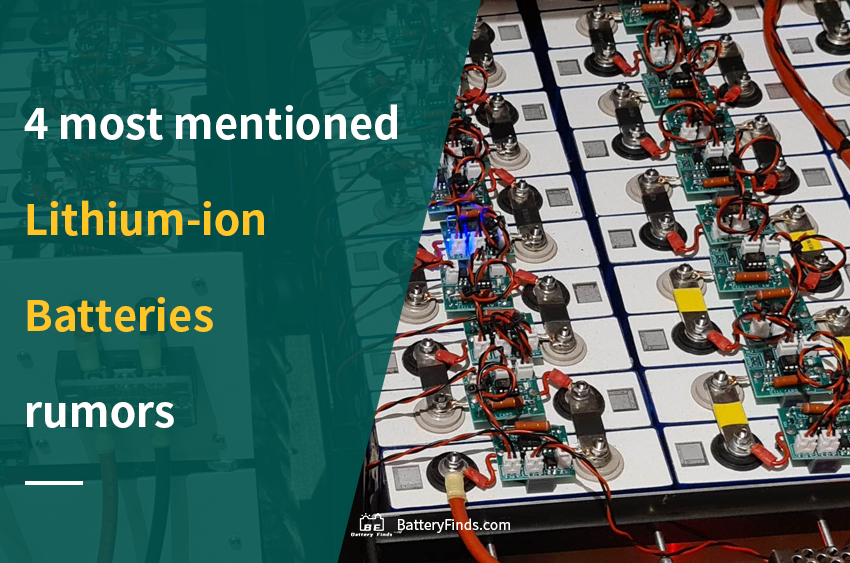Although many people have already entered the lithium-ion batteries, many people are in a state of unknowing much about the lithium-ion batteries, and many rumors also lead people to have a wrong perception of the lithium-ion battery, and these wrong perceptions will to a certain extent, it restricts people’s use of batteries. Interestingly, these rumors are interlinked.
Rumor 1:
Lithium-ion batteries refer to 3.7V "lithium-ion batteries"
This is one of the most widely circulated rumors. When many people mention lithium-ion batteries, they will default to 3.7V NMC/NCA batteries, ignoring a series of other lithium-ion batteries.
At present, the 3.2V LiFePO4 battery (LFP), 3.7V NMC/NCA batteries, and 2.3V LTO batteries that we are used to are all lithium-ion batteries, which is the truth. NMC/NCA batteries are only one of the lithium-ion batteries, but due to the lack of understanding of some people in the early days, most people now default to NMC/NCA batteries as “lithium-ion batteries”, which is undoubtedly wrong. concept. The 3.7V NMC/NCA battery should be called a ternary lithium battery, not a lithium-ion battery.
This rumor is still widely believed, so most people still think that lithium-ion batteries = NMC/NCA batteries. Hope that you can start to correct yourself and avoid trouble if you understand this situation.
Rumor 2:
Lithium-ion batteries are unsafe at all
A large group of people would consider lithium-ion batteries unsafe. This view can only be said to be partly true and partly wrong. The lithium-ion battery is a general term for a type of battery. Lithium-ion batteries with different cathode materials will have different chemical properties. The result is that some batteries will perform particularly well, while some batteries will be particularly safe.
At present, the LiFePO4 battery is the most commonly used battery for battery DIY. The energy density of this battery is not bad, but the safety is very good, and the price is not the most expensive. Therefore, the LiFePO4 battery is very popular and widely used for energy storage. class of projects. The safety of the LiFePO4 battery comes from its lithium iron phosphate positive electrode and the structure of the battery, so that it will not explode even if it is punctured and knocked hard, which is of great significance for ensuring our personal safety.
Likewise, LTO batteries are safer than LiFePO4 batteries, but NMC/NCA batteries are slightly less safe. So some people will say that the safety of lithium-ion batteries is not good. But at present, all lithium-ion batteries are required to be equipped with BMS, which can monitor the status of the battery and prevent the battery from overcharging/over-discharging/overcurrent. This will make the safety of Li-ion batteries better, so there are no so-called “unsafe lithium-ion batteries”.
Rumor 3:
Lithium-ion batteries don’t need BMS
This is one of the most outrageous rumors. BMS is a must for Li-ion batteries no matter what the situation is. Although no BMS is used, circuit protection devices like PCB/PCM are also required. It’s not a good idea to leave the battery running bare on its own. No matter how safe the chemical properties are, they will have a bad effect, and the final result will be battery damage. So no matter what type of lithium-ion battery it is, a BMS must be installed.
Rumor 4:
Lithium-ion batteries are expensive
Compared with lead-acid batteries, the price of lithium-ion batteries is undoubtedly high. To provide the same amount of energy, maybe a lead-acid battery would cost as little as $500, while a lithium-ion battery would cost upwards of $1,000. Generally speaking, in order of price, LTO battery > NMC/NCA battery > LiFePO4 battery, but this is only a reference, not absolute. The high price of lithium-ion batteries is only reflected in the upfront cost because the average life of lithium-ion batteries is longer than that of lead-acid batteries. During the long years of lithium-ion batteries, lead-acid batteries may face 2~3 replacements. And the overall cost of the lithium-ion battery will be lower.
Summary
There are many rumors about lithium-ion batteries, many of them, but each of them can lead you to abandon the lithium-ion battery or damage the lithium-ion battery. It would be a pity to miss lithium-ion batteries just because of the wrong perception.

